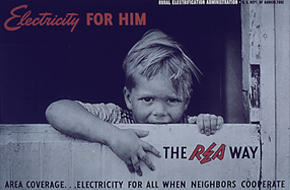
Late in Arriving, How Electricity Changed Rural New Hampshire Life
Presenter: Stephen Taylor
Imagine a New Hampshire town where some people enjoyed the benefits of electricity – lighting at the flick of a switch and reliable heating controlled by a thermostat – while others lived with smelly kerosene lamps and smoky box stoves. In New Hampshire, during the first half of the 20th century, residents of developed communities enjoyed the transformative benefits of electric power while those in the sparsely populated regions lived and worked in conditions little changed from the 19th century.
It took the coming of the New Deal's Rural Electrification Administration and a determined band of farmers to overcome opposition from the established private utilities to create the New Hampshire Electric Cooperative in 1939. Despite labor and material shortages during World War II, within a decade, power came to almost all of the previously unserved areas of the state. For thousands of households, this meant relief from the drudgery of the wood-fueled cookstove, the washboard and the kerosene lamp. Reliable electric power similarly brought new ways of life to farmers and artisans. This program will explore how these developments changed civic and social life in New Hampshire’s countryside, and touch the ways the disparity of broadband access in the state today echoes these earlier struggles.